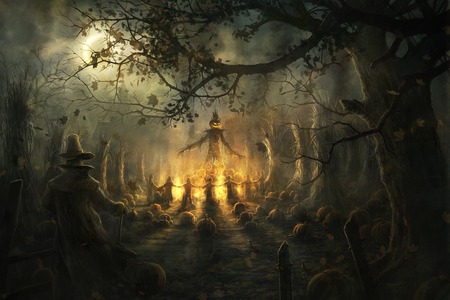Hallowe'en is a traditional respect and reverence for our ancestors

Hallowe'en is an ancient Celtic festival held annually in respect for the Dead - our recent and previous ancestors. It is a ritual festival of honouring those who have gone before us.
Americans have adapted their 'trick or treat' game to this time of year, but the Celtic meaning runs culturally deeper than lollies and kids doing tricks. Our forefathers had to condend with less in worse conditions - they struggled, they survived, they learnt and became wise. Hallowe'en is respect for the wisdom that came before us by our ancestors who have enabled the current generation thrive better than they did.
Traditionally, Hallowe'en is a colloquial abbreviated expression for 'All-Hallows-Even' meaning the evening before All Hallows Day, where All Hallows Day is 1st November. 'All Hallows' refers to all ancestors and a reverence toward them.
Jack-o' Lantern is a carved pumpkin associated with the pagan Hallowe'en feast. The tradition from Britain, Ireland and Celtic Europe involves a pumpkin with a face carved into it and candle light inside to project a ghostly flickering face of our ancestors. It originates from the pagan agrarian tradition in Ireland of using pumpkins as lantern light in the evening while harvesting turf (peat bog) for fuel heating to prepare for the onset of winter.
Indeed, the peat in the bog lands has been known to produce a light flammable gas which can spontaneously combust causing a phosphorescent flickering light, also traditionally termed 'will-o'-the-wisp' (Latin 'ignis fatuus'). The light is quite ghostly. The candle light of a carved pumpkin is also quite ghostly - one should try it with a pumpkin next Hallowe'en.
The Hallowe'en tradition is a noble one of respecting one's ancestors. It surpasses that of Christianity which adopted and manipulated the tradition and turned it into All Saints Day to celebrate the churches saints instead of one's ancestors. Surely Hallowe'en has more genuine grassroots meaning.
The Hallowe'en tradition also involves lighting a bonfire which is said to also have originated in Ireland during Pagan times when the Celts lit huge fires on the hills so the spirits could find their way. It was also said that these fires would help to keep away evil spirits. Another old Irish Halloween tale says that if you drop a strand of your hair into the flames and dream of your future husband or wife to be, you're dreams will come true!
Bonfires are a huge part of the Halloween festivities in Ireland and are lit in both rural areas and towns throughout the country. They are built from all sorts of materials and some take days of preparation!
There are many games associated with Halloween. Apples are a traditional Halloween fruit as they were very plentiful in October. One of the most popular Halloween games in Ireland is 'Snap Apple'. In this game an apple is hung from the ceiling and the children are blindfolded. The first one to take a bite from the apple wins! This game can also be played by putting apples into basin of water. The first person to lift out an apple by grabbing the stem with their teeth is the winner.
The tradition is pagan and is not confined to the Celts, but such recognition of the dead transcends many faiths as a form of Festival of the Dead.
The Hallowe'en tradition predates Christianity and so this is why mainsteam Christian faiths choose not to recognise its human value - it undermines their religious doctrine.
In ancient times, Celts celebrated a holiday called 'Samhain' (pronounced "Sa-wan") on the last day of October, the 31st. In the northern hemisphere this was at a natural time when the farming harvest had ended and the days started to get noticeably shorter and colder.
Such productive (oft 'weather fortuitous') harvest time induced a sense of respect for those who had made such riches possible and so this extended into a time for respecting one's ancestors.
Roman invasion of Britain and Europe eventually saw Christianity replace paganism. Hallowe'en was graduually replaced and inculated by the Christian All Saints' Day on not 31st October, but 1st November. It was part of a concerted Christian deculturation of local primitive faiths. Today, the Catholic church recognises 2nd November 2nd All Souls' Day to honour the dead.
Mmm, I respect the deep human-earth meaning of Hallowe'en, rather than the invasive religious ulterior motive of compliance.


Recent comments